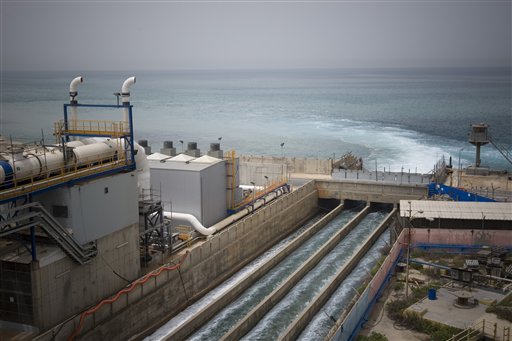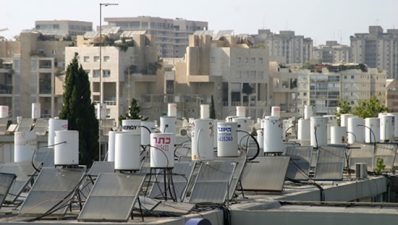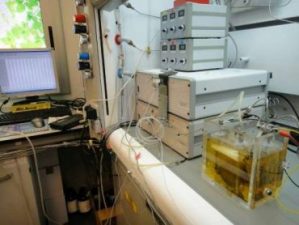 Desalination is considered one of Israel’s many genius innovations. That genius is now being applied to oil substitutes.
Desalination is considered one of Israel’s many genius innovations. That genius is now being applied to oil substitutes.
Long considered leaders of R&D and Clean Technology, particularly in the fields of water desalination and solar energy technology, Israel has now set firm sights on leading the shift away from oil dependence. Between now and 2020, the tiny country intends to spend NIS 14 billion (US $ 3.82 billion) to help innovators and researchers test viable alternatives to oil. And while often slow to implement their own technology, cooperation with Europe may change that.
Two crucial conferences will help foster a greater technological exchange between Europe and Israel – the chair of Eureka High Level Group (HLG), Europe’s R&D program with which 40 countries are involved.
The first, where 500 European parliamentarians are expected to make an appearance, is the European Friends of Israel in Jerusalem this week. In addition to the conference, attendees will visit Israel’s leading industrial plants.
According to Globes, this is significant because the plants represent “a market of 375 million consumers, who could help promote Israeli technology.”
The second is the Eilat-Eilot Renewable Energy Conference considered so important on the international renewable energy scene that the European Commission included it in their ECO4B enterprise network. This year, 2,000 businessmen and women, researchers, government representatives, and investors will attend.
European Climate Action Commissioner Connie Hedegaard, Paolo Romani (leading a large Italian delegation and Italy’s Economic Development Minister), Karl-Josef Kuhn, principle engineer of Siemens AG, and head of Siemens Corporate Technology E-Ca,; and Dr. Gabriel Marquette, Director of European Affairs at Schlumberger Research are among some of the heavyweights, Globes reports.
Removing political roadblocks and rising golden innovations will be among the conference foci.
Meanwhile, Israel has finalized a solid plan for the next several years. In addition to the Arava Renewable Energy Technology Center, the government will pour enormous sums into oil substitutes in order to slip out from underneath OPEC’s oppressive monopoly.
Led by Prof. Eugene Kandel, on January 30, 2011 the National Economic Council approved a national plan for developing alternatives. It includes investing nearly a quarter of the committed $3.82 billion during the first five years and the remaining money the following five years.
This money will be used to help roughly 100 startup companies and research institutions, as well as nourish existing businesses or “incubators.” Some of the money will be used to build pilot installations, while the rest will be allocated to testing and implementation.
The Prime Minister will also award an annual prize of NIS 1.5 million to innovators that develop oil alternatives in order to encourage would-be inventors to put forth their clever ideas.
All of these steps demonstrate that Israel is taking oil substitutes very seriously, which in turn should boost confidence among consumers and developers. Nor does the plan involve operating in a vacuum. Ideas will be sought from other high-tech producing countries that have an equal stake in reduced oil dependence, such as China and India.
Dr. Opper, chairman of Eureka High Level Group and a member of the steering committee that formulated the national plan, believes that its ambitious goal is attainable, according to Globes.
“If Israel helps to solve the world’s dependence on oil, it will turn out to have been a very important decision,” he said.
:: Globes
More On Technological Innovation From Israel:
US Firms Look To Israel For Clean Tech Partnerships
Israel Cleantech Intelligence: Desalination and Six More
Eilat-Eilot Conference: The Ins & Outs Of Renewable Energy In Israel




Amazing information all around! Thanks Tafline. I just wish this was the kind of news from this part of the world that would make the headlines…sigh.
Thanks Carl! Very interesting.
Petroleum comes from algae (which, like many living things, make oil) that has been locked away and cooked by the heat of the Earth for millions of years.
it would seem a lot cheaper and easier to just grow algae and turn it into liquid fuel. Added benefit: it takes carbon out of the air. And it doesn’t compete with poor people for food crops as corn ethanol does.
In a new book, “The View From Lazy Point; A Natural Year in an Unnatural World” ( http://bit.ly/gATt4E ), I show that some algae yields up to 30 times more fuel than other energy crops. Airlines are already testing algae-based jet fuels. “The airplane performed perfectly,” one test-pilot said. “It was textbook.”
These aren’t even all the options. Other non-edible plants also produce oil. The seeds of Jatropha curcas are about one-third oil.
As I say in the book, “Compared to the possible oceans of improvements, humanity is still dog-paddling in the shallow end of the kiddie pool. Sometimes we seem determined to drown there just because we won’t stand up.”
This post brings very welcomed news.